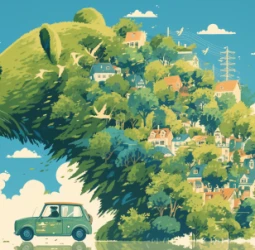The Atlantic Forest, also known as Mata Atlântica, is a vast tropical forest region that stretches along the eastern coast of Brazil, covering an area of approximately 1.5 million square kilometers. This forest is one of the most biologically diverse and ecologically rich regions in the world. However, over the years, the Atlantic Forest has faced significant deforestation due to human activities like agriculture, urbanization, and logging. As a result, the Atlantic Forest has lost more than 90% of its original cover, leading to severe environmental consequences. In recent years, Brazil has taken significant steps to restore this valuable ecosystem through reforestation efforts. In this article, we will discuss the importance of Atlantic Forest restoration and the initiatives being taken to achieve it.
The Atlantic Forest is home to a vast array of plant and animal species, many of which are found nowhere else on the planet. The high level of biodiversity in this forest is crucial for maintaining the ecological balance of the region. It also serves as a vital carbon sink, absorbing large amounts of carbon dioxide from the atmosphere and helping to combat climate change. Furthermore, the Atlantic Forest is a crucial source of water for millions of people living in Brazil, as it is responsible for the regulation of the water cycle in the region. Therefore, the loss of this forest has severe implications for both the environment and the people who depend on it.
In response to the alarming rate of deforestation, the Brazilian government has launched several initiatives to restore the Atlantic Forest. One of the most significant efforts is the Atlantic Forest Restoration Pact, which was created in 2009. This pact brings together governments, NGOs, private companies, and local communities to collaborate on restoring the forest. The ultimate goal of this pact is to restore 15 million hectares of degraded land by 2050, which is equivalent to the size of Portugal.
In addition to the pact, several other initiatives are being taken to restore the Atlantic Forest. One such project is the "Arpa for Life" program, which aims to restore 15 million hectares of the forest in the next 25 years. This project also focuses on promoting sustainable development in the region by creating economic opportunities for local communities.
Furthermore, there are also various private companies and NGOs involved in reforestation efforts in the Atlantic Forest. For example, The Nature Conservancy, one of the world's leading conservation organizations, has planted over 2 million trees in the region since 2008. This organization also works closely with local communities to educate them about the importance of forest restoration and involve them in the process.
The restoration of the Atlantic Forest is a challenging task that requires a long-term commitment from all stakeholders involved. Success will only be achieved through the collective efforts of governments, NGOs, private companies, and local communities. However, despite these efforts, there are still significant challenges to overcome. One of the major obstacles is the lack of political will and resources to implement effective restoration strategies. Moreover, the Atlantic Forest continues to face threats from illegal logging, land grabbing, and wildfires, which hinder the progress of restoration efforts.
In conclusion, the restoration of the Atlantic Forest is a crucial step towards mitigating the effects of deforestation and preserving a vital ecosystem. This region plays a significant role in sustaining life in Brazil, and its restoration is crucial for the future of the planet. While there are challenges ahead, the various initiatives being taken to restore the Atlantic Forest give hope for a greener and more sustainable future. It is our responsibility to support these efforts and play our part in protecting this valuable natural resource.
The Atlantic Forest is home to a vast array of plant and animal species, many of which are found nowhere else on the planet. The high level of biodiversity in this forest is crucial for maintaining the ecological balance of the region. It also serves as a vital carbon sink, absorbing large amounts of carbon dioxide from the atmosphere and helping to combat climate change. Furthermore, the Atlantic Forest is a crucial source of water for millions of people living in Brazil, as it is responsible for the regulation of the water cycle in the region. Therefore, the loss of this forest has severe implications for both the environment and the people who depend on it.
In response to the alarming rate of deforestation, the Brazilian government has launched several initiatives to restore the Atlantic Forest. One of the most significant efforts is the Atlantic Forest Restoration Pact, which was created in 2009. This pact brings together governments, NGOs, private companies, and local communities to collaborate on restoring the forest. The ultimate goal of this pact is to restore 15 million hectares of degraded land by 2050, which is equivalent to the size of Portugal.
In addition to the pact, several other initiatives are being taken to restore the Atlantic Forest. One such project is the "Arpa for Life" program, which aims to restore 15 million hectares of the forest in the next 25 years. This project also focuses on promoting sustainable development in the region by creating economic opportunities for local communities.
Furthermore, there are also various private companies and NGOs involved in reforestation efforts in the Atlantic Forest. For example, The Nature Conservancy, one of the world's leading conservation organizations, has planted over 2 million trees in the region since 2008. This organization also works closely with local communities to educate them about the importance of forest restoration and involve them in the process.
The restoration of the Atlantic Forest is a challenging task that requires a long-term commitment from all stakeholders involved. Success will only be achieved through the collective efforts of governments, NGOs, private companies, and local communities. However, despite these efforts, there are still significant challenges to overcome. One of the major obstacles is the lack of political will and resources to implement effective restoration strategies. Moreover, the Atlantic Forest continues to face threats from illegal logging, land grabbing, and wildfires, which hinder the progress of restoration efforts.
In conclusion, the restoration of the Atlantic Forest is a crucial step towards mitigating the effects of deforestation and preserving a vital ecosystem. This region plays a significant role in sustaining life in Brazil, and its restoration is crucial for the future of the planet. While there are challenges ahead, the various initiatives being taken to restore the Atlantic Forest give hope for a greener and more sustainable future. It is our responsibility to support these efforts and play our part in protecting this valuable natural resource.



 dev1
dev1















